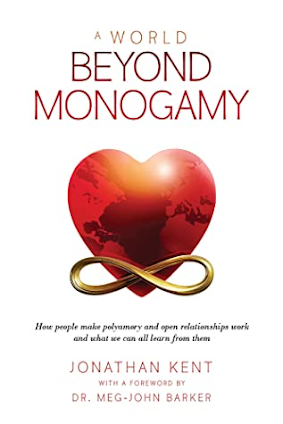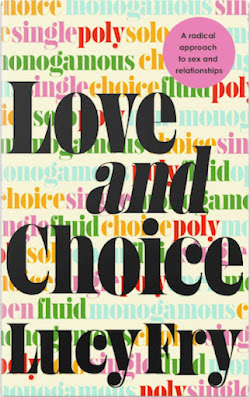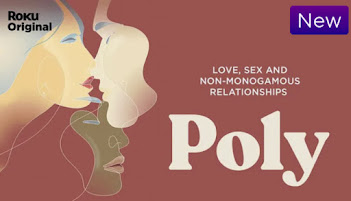Throuple Restaurant, new polyamory books, the coming of three or more legal parents, and more
 |
| A table at Throuple |
...This first-of-its-kind polyamorous eatery, aptly called “THROUPLE” will celebrate polyamory and break down the taboos surrounding non-monogamous love....Established sexual wellness brand LELO UK brand is encouraging people to embrace the freedom of being able to choose a relationship style which works for them and not feel restricted by the social norm of monogamy. THROUPLE’s intention is to create a safe space for people in polyamorous relationships, so they can enjoy a romantic night out with their significant others without having to worry about people questioning the additional seat or seats.While designed for throuples, this unique restaurant welcomes all polyamorous people – whether they’re in a four-way or even five-way relationship. There’s a place for everyone.
The world's first-ever restaurant for polyamorous relationships sold out within 12 hours as 400 people tried to book a table for Valentine's Day. ...Luka Matutinovic, LELO’s CMO, said: "It safe to say that THROUPLE could become an annual event following its huge success this Valentine’s Day."
This legal change will make children’s lives more stable, not less.

Six states have enacted laws expressly allowing a court to recognize more than two parents for a child. Many others are considering similar proposals. (iStock)
By Courtney G. Joslin and Douglas NeJaime
It soon could be unremarkable for a child to have three or more legal parents. After months of political wrangling over how to support families, this may sound fantastical, but it’s fast becoming reality: Six states — California, Delaware, Maine, Vermont, Washington and most recently Connecticut — have enacted laws over the past decade expressly allowing a court to recognize more than two parents for a child. Many others, including Massachusetts, are considering similar proposals.These new laws have been spurred, in part, by the rising numbers and public profile of LGBTQ families and others with children conceived through assisted reproduction. In many of these families, one or more parents are not genetically related to their children, and many states now legally recognize these “intended parents.” When we realize that genetic connection isn’t required for a legal parent-child relationship, and that social criteria are relevant, limiting the number of parents to two no longer seems necessary or logical.These multiparent laws enable courts to protect parent-child relationships as they exist in the world. This is important. Legal recognition is more than a bureaucratic formality: When parent-child bonds lack legal protection, children suffer. They may be denied crucial benefits — unable to access health insurance through their parent or receive government aid. Worse yet, when a child’s relationship to a parent is not recognized under law, that relationship can be permanently severed — for instance, if there is a custody dispute or if the legal parent dies. If the child enters the child welfare system, they may be removed from a legal parent and placed in foster care, rather than placed with another person whom the child considers a parent. Such separation can have devastating and long-term developmental consequences. ......Multiparenthood is hardly new. ... Examples include children who develop parent-child relationships with one or more stepparents, as well as children who have living biological parents but are raised primarily or exclusively by other relatives or friends. Long before statutes expressly permitted it, courts extended parental rights to people besides a child’s biological parents. Such decisions reflected the understanding that these relationships can be vital to children and that protecting them is often critical to children’s well-being. ......The next normal, then, may not be a sweeping legal or societal change, but something simpler: more jurisdictions recognizing and protecting the families that exist today, right now.
...Relationship therapists say it can be done, but only with guidelines in place—and it certainly isn’t for everyone. Curious? Here’s what you need to know. ...“To me, an open relationship is one of the many types of ethical non-monogamy, meaning two or more people have decided to date other people or have romantic relationships with other people that everyone consents to,” says Maria Laguna, LCSW, a therapist at Frame.Laguna says there isn’t one set way that this look. One couple, for example, may define an open relationship as being able to have sexual relationships with other people but not emotional connections. Another couple may decide sex outside of the relationship is off the table, but emotional bonds are okay....But open relationships in either case, Laguna says, are different from polyamory. “With polyamory, the bonds between different partners can be equally strong, whereas in an open relationship the bond is strongest between two people. For example, in a polyamorous relationship, there could be three people who all have the same intensity of [sexual or emotional] bonds,” she says....
Jennifer Silvershein Teplin, LCSW, the founder and clinical director of Manhattan Wellness, says that when she hears from someone (or a couple) that they are interested in an open relationship, she first asks them what the motivation behind it is. “If it’s a couple who has been in a committed relationship, such as marriage, and are now talking about opening it up, I first ask if there are needs not being met,” Teplin says.Sometimes, she says, this unearths that a partner feels they lack an emotional connection or a physical connection with their partner that they once had. A relationship therapist can help a couple decide if the needs not being currently met can be met in their relationship or if it truly does make sense to open it up....“If one person in the relationship is only agreeing to an open relationship to satisfy their partner and it’s not something they truly want, it may not be sustainable and may create resentment,” Teplin says. For this reason, she emphasizes that both people must be fully interested in having an open relationship for it to truly work....If you weigh the risks and benefits and decide that an open relationship is right for you, all three therapists say it’s important to establish clear guidelines that make both partners feel comfortable. “This requires an honest conversation where both people voice what their needs are,” Teplin says. She says that it’s important for both people to feel safe physically and emotionally. This involves talking about using protection if the relationship is opening up to new sexual partners.“Think of the guidelines as a living document; they aren’t set in stone and can change over time,” Teplin says. “But it’s important to keep communicating.”
...My first encounter with polyamory was in 2012 when I read a blog post entitled A short instructional manifesto for relationship anarchy by Andie Nordgren. Phrases burst out of the page: "every relationship is unique"; "customize your commitments"; "love and respect instead of entitlement."It was an invitation not to dismiss monogamy, but rather to rethink what we mean when we talk about love, commitment and intimacy, something I'd barely stopped to question. So I decided to talk to people who had been pushing back the boundaries of what relationships might look like....-----------------------------Many of these people, I've found, have discovered a level of intimacy through being nakedly — and hopefully also compassionately — honest with one another in a way that plenty of monogamous people could only dream of.Seb, an international lawyer based in Southeast Asia, says that's what sustained his and his wife's relationship when they opened up their marriage eight years ago after being together for three years. They each have one [other] long-term partner and also date casually when the moon takes them. "There are people whose bandwidth for extra partners is limited," Seb says. But if it isn't then "It's a case of lots and lots of communication and being very clear what you want and don't want out of the relationship. ... The aim is to effectively grow these relationships so they're able to meet the needs of multiple people."-----------------------------...I asked one academic, Dr Dylan Selterman, now an associate teaching professor at Johns Hopkins University, what single thing he had encountered while researching consensual non-monogamy that had really made him sit up and think. His answer: compersion. "There's an association between the closeness and intimacy that people have with their partners' 'others' and feeling less jealousy. And that seems to be one of the big strategies."
Cuckoos: Like cowboys, cuckoos try to monopolize a consensually non-monogamous person, but in a more insidious manner. In other words, "I'm saying I'm poly, but actually I want this person all to myself, so I'm going to try and make everybody else so uncomfortable in the relationship that they leave."
By Romano Santos...In his research for the book, the journalist spoke to CNM academics and activists, as well as around 40 people of different ethnicities, religions, sexualities, and backgrounds from around the world who practice polyamory or some form of CNM. In the process, he questioned the nature of commitment, intimacy, and relationships at large, and found that there isn’t just one way to be polyamorous.For starters, people get into polyamory for a number of reasons.“There are quite a few people who think that they have always felt this way. It’s never made any sense to them why you should be devoted to one person in particular,” Kent told VICE.Other people find themselves in polyamorous relationships because they happen to like having multiple sexual partners, sometimes because sleeping with just one gender, let alone one person, doesn’t quite encapsulate the totality of their sexuality. Some people turn to it because they want friendships without set boundaries, meaning they are able to flow into more physical or romantic spaces with some of their friends in different situations.But polyamory is not always about having more, or hotter, sex. According to Kent, most of the polyamorous people he interviewed for the book stayed in their relationships more for the romance and emotion than for the sex.When people hear about polyamory, many might imagine threesomes. But few will consider the possibility of three, four, or even more people sharing the responsibility for mundane things like cooking and washing dishes, as well as sharing more abstract things like emotional support and belongingness.“We need to belong, or the vast majority of us do, and I think that sense of belonging is one of the powerful attractions of consensual non-monogamy—because people find themselves in something bigger than themselves,” Kent said.Seen in this light, polyamory is not just about the relationships one has with multiple lovers. It’s also about the relationships one has with their lovers’ lovers, and even their lovers’ lovers’ lovers, all of which contribute to a greater sense of belonging. ...
1. Blindly following our ‘blueprint’
Each of us grows up with a ‘blueprint’ around relationships; a set of unwritten rules that we have absorbed or inherited. ...As Anita, a 46-year-old writer and coach, told me about her 30-something self: “I had internalised the supposed set of rules about how to live my life to such a great extent that I could not decipher any other options. The difference now that I’ve tried different relationship structures is that I am aware I have choices. I know exactly when I am choosing something and so I don’t feel weighed down like I used to.”2. Confusing intimacy with mergingToo many people grow up believing that a happy, committed relationship means you should want or try to spend all your free time with your partner. ...It’s difficult to engage in any fulfilling, meaningful connection with another without a strong sense of where you end and another begins. ...3. Avoiding conflictIf you’re scared of disagreeing with a partner, it’s likely you have pushed down some important issues that would be better out in the open. ...4. Destructive or indirect communication
Just as learning how to argue better can enhance your relationship, so too can learning constructive communication methods. ...5. Unresolved attachment issuesThe way you’ve been loved (or neglected) in childhood will impact how you ‘do’ relationships as an adult. This is particularly true for those who have not yet looked at their own inherited ‘attachment patterns’: the ways they relate to others, particularly under stress.Attachment patterns are like a personal schema for how someone deals with separation (or the threat of it), conflict and closeness. But they become issues when we continue to follow old patterns unconsciously. It’s like trying to use a computer without ever doing any updates – possible, but increasingly difficult as time goes on.Kickstart your exploration with questions like: Do you believe loved ones will respond to you and be reliable (within reason, most of the time)? Or do you worry that they will leave, that you are too much, not enough or wrong? ...
...[Fry] wrote Love And Choice because it’s the book she needed but couldn’t find when she and a former partner — together for nine years, seven of them civilly partnered — found themselves wondering, ‘Is this all there is?’ and decided to open up their relationship.
By Catherine DerWhen I saw Iron Widow by Xiran Jay Zhao [a Young Adult bestseller published last fall] in my local bookstore, I knew I would buy it. A red and black colour scheme with an Asian woman on the cover? It’s my whole aesthetic. When I turned it over, the words “fight to shatter patriarchal definitions of power” read loud and clear....However, I was not expecting my entire definition of a classic romance trope to change. ... I’ve become quite acquainted with the love triangle. Usually, it’s one female being pursued by two guys. I can almost guarantee that one of those men is morally grey and mysterious with a dangerous past, probably with colourful eyes or a tattoo. ......[But] Just as Zetian and Shimin are becoming close, Yizhi finds his way back to her. I mean, it was obvious he would, especially after he offered to marry her instead of having her go off to war. ......Zhao has done an impeccable job at developing a totally shippable polyamorous relationship. The readers can clearly see the attraction and passion between all three characters, as well as the love that underlies it all. So much of the relationship is implicit, which speaks to the skill that Zhao has in developing characters and their romance. ......By the time I was halfway through the book, I was shipping all three of them together. I had never done that before. I had never before wanted a main character to end up with both her love interests, and at the same time want the two love interests to end up together. ...Enough of the classic love triangle—if we can even call it that. The resolution of these triangles is always so unsatisfying anyways. No more killing off beloved characters; no more making them leave because of some inexplicable reason; no more merging the two love interests into one person (I’m looking at you, Rick Riordan). Polyamory is the only solution to love triangles, and Iron Widow is the prime example on how to do that.
SUBSCRIBE by a feed, or
SUBSCRIBE by email
_________________________
[Permalink]
Labels: #Poly101, #PolyLegal, books, legal






2 Comments:
FYI: The Iron Widow has 74 holds on 16 copies in the Seattle Public Library system. I looked at a few other books on poly, and Iron Widow is pretty popular by comparison. The audiobook of The Ethical Slut has about the same number of holds and copies as Iron Widow.
I read the Iron Widow review and found that the reviewer used the word "ship" to mean pretty much what we mean by compersion.
https://www.urbandictionary.com/define.php?term=ship
Post a Comment
<< Home